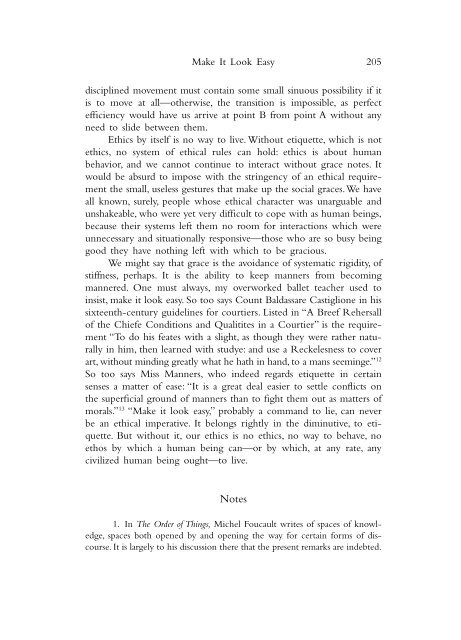Create successful ePaper yourself
Turn your PDF publications into a flip-book with our unique Google optimized e-Paper software.
Make It Look Easy<br />
205<br />
disciplined movement must contain some small sinuous possibility if it<br />
is to move at all—o<strong>the</strong>rwise, <strong>the</strong> transition is impossible, as perfect<br />
efficiency would have us arrive at point B from point A without any<br />
need to slide between <strong>the</strong>m.<br />
Ethics by itself is no way to live. Without etiquette, which is not<br />
ethics, no system <strong>of</strong> ethical rules can hold: ethics is about human<br />
behavior, and we cannot continue to interact without grace notes. It<br />
would be absurd to impose with <strong>the</strong> stringency <strong>of</strong> an ethical requirement<br />
<strong>the</strong> small, useless gestures that make up <strong>the</strong> social graces. We have<br />
all known, surely, people whose ethical character was unarguable and<br />
unshakeable, who were yet very difficult to cope with as human beings,<br />
because <strong>the</strong>ir systems left <strong>the</strong>m no room for interactions which were<br />
unnecessary and situationally responsive—those who are so busy being<br />
good <strong>the</strong>y have nothing left with which to be gracious.<br />
We might say that grace is <strong>the</strong> avoidance <strong>of</strong> systematic rigidity, <strong>of</strong><br />
stiffness, perhaps. It is <strong>the</strong> ability to keep manners from becoming<br />
mannered. One must always, my overworked ballet teacher used to<br />
insist, make it look easy. So too says Count Baldassare Castiglione in his<br />
sixteenth-century guidelines for courtiers. Listed in “A Breef Rehersall<br />
<strong>of</strong> <strong>the</strong> Chiefe Conditions and Qualitites in a Courtier” is <strong>the</strong> requirement<br />
“To do his feates with a slight, as though <strong>the</strong>y were ra<strong>the</strong>r naturally<br />
in him, <strong>the</strong>n learned with studye: and use a Reckelesness to cover<br />
art, without minding greatly what he hath in hand, to a mans seeminge.” 12<br />
So too says Miss Manners, who indeed regards etiquette in certain<br />
senses a matter <strong>of</strong> ease: “It is a great deal easier to settle conflicts on<br />
<strong>the</strong> superficial ground <strong>of</strong> manners than to fight <strong>the</strong>m out as matters <strong>of</strong><br />
morals.” 13 “Make it look easy,” probably a command to lie, can never<br />
be an ethical imperative. It belongs rightly in <strong>the</strong> diminutive, to etiquette.<br />
But without it, our ethics is no ethics, no way to behave, no<br />
ethos by which a human being can—or by which, at any rate, any<br />
civilized human being ought—to live.<br />
Notes<br />
1. In The Order <strong>of</strong> Things, Michel Foucault writes <strong>of</strong> spaces <strong>of</strong> knowledge,<br />
spaces both opened by and opening <strong>the</strong> way for certain forms <strong>of</strong> discourse.<br />
It is largely to his discussion <strong>the</strong>re that <strong>the</strong> present remarks are indebted.
















